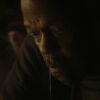There’s a type of good humor that’s forged in the chill of the northeast, a warmth to keep the cold away that’s ever-present in “Tumbledown,” Sean Mewshaw’s feature debut that among other fine qualities bestows a sense of decency to each of its characters you rarely see elsewhere. It’s particularly frigid in the area of Maine that’s home to Hannah (Rebecca Hall), who idles away her days filing stories about the locals for her small-town paper after losing her husband Hunter to a tragic accident years before. To Hannah, it was a devastating loss of someone that felt everything so deeply including his love for her, but to the rest of the world, the death meant the loss of an icon who gave voice to their own feelings as a singer/songwriter who left behind just one album to chew on, which is why Andrew (Jason Sudeikis), a pop culture professor from Hofstra shows up on her doorstep, hoping to write a book about Hunter that will help cement his legacy.
Although such a premise wouldn’t seem to lend itself to a fizzy romantic comedy, “Tumbledown” eventually veers in that direction due to the undeniable chemistry between Hall and Sudeikis from their very first scenes together, as well as the rat-a-tat patter provided by Desi Van Til that suggests she might’ve been an ideal screenwriter for Howard Hawks. Yet despite the sharp tongues – at first to trade barbs as Hannah weighs giving Andrew access to Hunter’s archives before insisting that she handles the writing of a biography herself – the film is driven by its heart, not in some treacly way, but in how emotional logic often overtakes what might be in its characters’ best interests practically for better or worse. Many films have shown how characters hold onto the past at the expense of their present, but few express it in the way Mewshaw and Van Til do so effortlessly here, with Hannah’s inhibitions and Andrew’s hesitation at going too far in prodding her embedded into their sparring sessions.
Such consideration is extended to even the smallest parts in “Tumbledown,” which collects an impressive ensemble as a result. Blythe Danner and Richard Masur appear for only a couple scenes as Hannah’s parents, who are suspicious of Andrew’s intentions, but speak so much to who Hunter was in Hannah’s life. (Music written and performed by Damien Jurado, tastefully used throughout, also gives hints.) The film also gives far more dimension than usual to the typically stock roles of Hannah and Andrew’s significant others, a venison-gathering friend with benefits (Joe Manganiello) and a fixture in the New York music industry (Dianna Agron), respectively, who could so easily be villainized, but instead add to the flavor of the film and make Hannah and Andrew’s tenuous relationship all the more challenging. A handful of moments with locals such as a grandmother Hannah interviews for her part-time job who is clearly thrilled to be recognized in the paper or a townie who asks Hannah to dance while she’s out to dinner with Andrew give “Tumbledown” further spice – and charm.
By the time “Tumbledown” reaches its genuinely rousing conclusion, you could wonder why Hannah was ever down in the dumps, but it’s all the more satisfying because of the path she has to take to get there. As Hannah laments at one point, “I had so much love in my arsenal and I never got to spend it” – the same is half true about the film she’s in. When “Tumbledown” is over, you feel awash in that love.
“Tumbledown” will open on February 12th throughout the country and be available through iTunes and Amazon Video.




